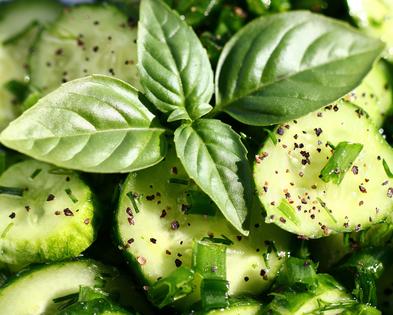Environmental Nutrition: Keep your cool in the kitchen
Certain ingredients (mostly herbs and spices) have naturally cooling effects on the body, and incorporating them into meals and snacks can help support hydration, digestion, and temperature regulation. Isn’t that cool? (Pun intended). Here’s a look at a few of our favorites.
Mint. Perhaps the best-known cooling herb, mint contains menthol, a compound that activates cold-sensitive receptors in the skin and mouth, creating a refreshing, cooling sensation. Mint can be added to water or iced tea, blended into smoothies, or chopped into yogurt as a dip or sauce.
Cilantro (coriander leaves). Cilantro is rich in antioxidants and may support the body’s natural detoxification processes. Its high water content and fresh flavor make it a go-to in warm-weather cooking. Add to salsa, guacamole, or sprinkle over tacos and chilled soups like gazpacho.
Fennel seeds. Used in Ayurvedic medicine for their cooling and digestive properties, fennel seeds may help reduce internal heat and soothe the stomach. Try chewing a small amount after meals or brew into a mild tea. Fennel also pairs well with cucumber and citrus in refreshing summer salads.
Cardamom. Although warming in winter drinks, cardamom is paradoxically used in traditional medicine to balance body temperature. It may support digestion and reduce inflammation, which can help the body handle heat more effectively. Add ground cardamom to smoothies, chilled rice pudding, or yogurt-based lassi.
Cucumber and basil. While not a spice, cucumber is hydrating and often used with cooling herbs like basil, which contains eugenol — a compound linked to anti-inflammatory and mild cooling effects. Together, they’re great in infused water, salads or wraps.
Turmeric (in moderation). Turmeric is warming in nature but has anti-inflammatory properties that may help with heat-related inflammation or skin irritation. A small amount in cold golden milk with almond milk and honey can be both soothing and beneficial.
By thoughtfully incorporating these herbs and spices into meals and snacks — especially in fresh, raw, or lightly cooked forms — you can add flavor while helping your body stay balanced in hot weather.
(Environmental Nutrition is the award-winning independent newsletter written by nutrition experts dedicated to providing readers up-to-date, accurate information about health and nutrition in clear, concise English. For more information, visit www.environmentalnutrition.com.)
©2025 Belvoir Media Group, LLC. Distributed by Tribune Content Agency, LLC.











Comments